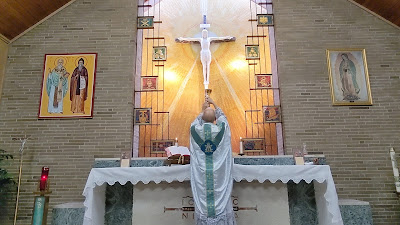In a book on spirituality, Jesuit author J. Francis Stroud tells a story about how to catch a monkey. It goes as follows:
In India hunters have a simple but effective way to capture monkeys. They cut a hole in a coconut large enough for the monkey’s hand to go in, but small enough to hold it captive if it makes a fist. They then put a banana into the coconut and wire the coconut to a tree. The monkey puts its hand into the coconut, grabs the banana, but cannot get its hand out because it won’t open its fist and let the banana go.
Today is the 18th Sunday in Ordinary Time.
In the Gospel, after Jesus challenges the people who had eaten the miraculous multiplication of loaves and fishes, they turn on Him and ask: “What sign can you do, that we may see and believe in you? What can you do?”
They even recall the miraculous rain of man’na that their “ancestors ate ... in the desert.”
What Jesus does tell them is that His “Father gives you the true bread from heaven” and that this bread “gives life to the world.”
They immediately respond, “Sir, give us this bread always.”
The crowd flips and then flops. They eat the bread Jesus miraculously multiplied, and follow Him across the sea. When Jesus challenges them, they turn on Him and demand a sign. He ignores their challenge, and instead tells tells them that His Father is the source of this bread. Then they ask for this miraculous bread always. Flip. Flop. Flip. Flop.
It may be helpful to realize that a few chapters after the scene we heard from the Old Testament in Exodus, the people who are at first impressed with the miraculous man’na ... after eating it day-in and day-out, go back to complaining – later on – about how sick they are of the man’na.
Is this some odd trait of human nature? When confronted with a miracle, there is an initial amazement, but after a while ... miracle schmear-a-cle ... and they’re on to something new. Or else get excited about a miraculous free lunch, but when challenged, make demands for more miracles.
Saint Paul provides a clue in his Letter to the Ephesians, where he exhorts us to “put away [our] old self ... and be renewed in the spirit of [our] minds.” By putting on a new self, he tells us we will be re-created “in God’s way in righteousness and holiness of truth.”
Like the monkey, caught in the coconut trap, we need to be constantly reminded to put away our old self ... our old habits ... our old sins ... our old ways of thinking. We get caught in the trap of the past and it seems that under our own power we just can’t let go.
Every week, we come here to worship God. In a miraculous re- presentation of the Sacrifice of Jesus on the Cross, we are given His Body and Blood, Soul and Divinity under the form of bread and wine.
But are we trapped in worldly values and habits that prevent us from being renewed in Christ? Are we clinging to an old self or past hurts or perceived slights? Are we trapped in habitual sins that we refuse to repent of or be freed from? Are we unable to let go of all of this and allow the grace of God to re-create us in holiness and righteousness?
Do we flip ... flop ... flip ... flop between sin and virtue without any end in sight?
The answer is – Let Go and Let God. Jesus Christ is truly here ... in the Word of God ... and in the Blessed Sacrament of the Altar. We must, indeed, put away our old self, old ways, old habits, and old sins ... and allow God’s grace and mercy to renew us in Christ.
As we approach this altar to receive the Sacred Body and Blood, Soul and Divinity of Jesus Christ, let us pray for that renewal in our hearts, minds, and bodies. Let us see the miracle of grace that is here before us. Let us fix our eyes on Jesus Christ – the Bread of Life – and receive the new life that we have been promised ... in Christ Jesus our Lord.















